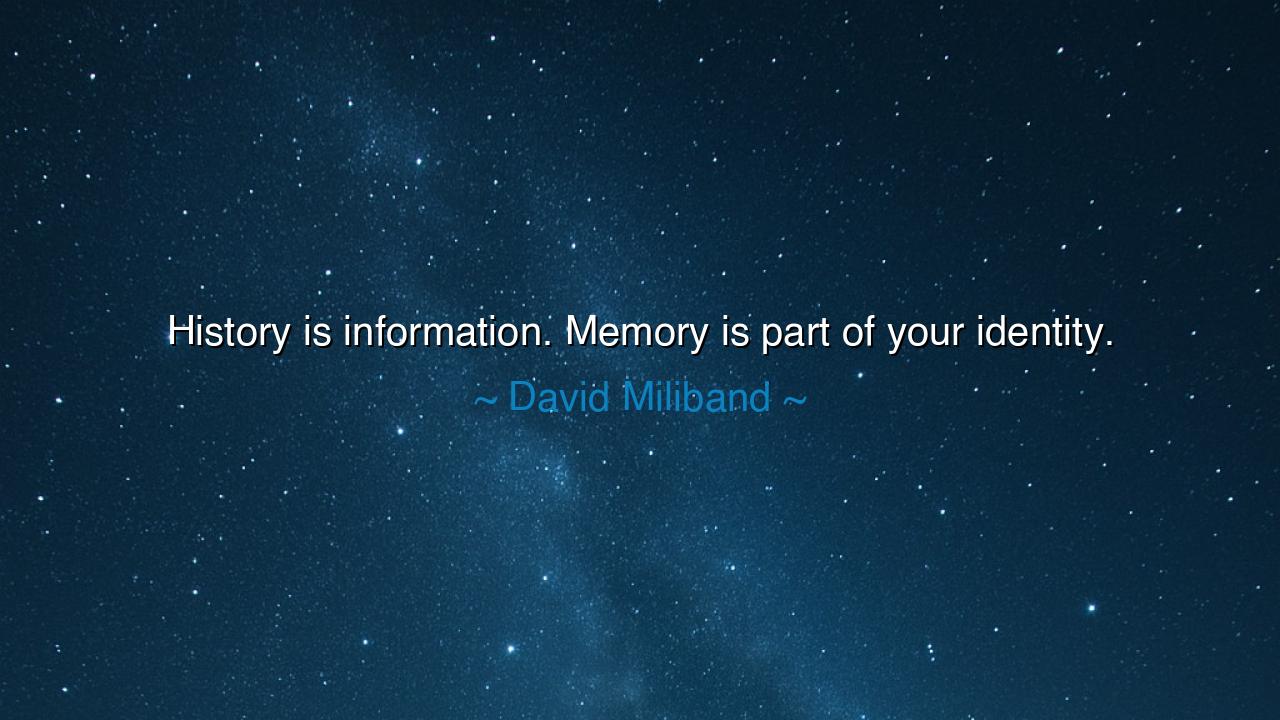
History is information. Memory is part of your identity.






In the words of David Miliband, spoken with the clarity of one who has studied both the rise and fall of nations, there rests a truth that bridges the realms of intellect and soul: “History is information. Memory is part of your identity.” These words divide two powers that often appear the same — history and memory — yet in their difference lies the key to understanding who we are. History is the record of what happened; memory is the living fire of how it is remembered. One belongs to the mind, the other to the heart. Without history, we lose knowledge. Without memory, we lose ourselves.
The origin of this insight lies in the ancient tension between the scholar and the storyteller. History, as Miliband calls it, is information — the cold, ordered archive of facts, dates, and causes. It is the work of the historian, who seeks to preserve truth without emotion. But memory, the second half of his statement, is something far older and more sacred. It is the whisper of ancestors, the pulse of experience passed down through story and ritual. Memory is not merely data; it is identity — the bridge between the individual and the tribe, between the past and the living present. In the union of these two — history and memory — humanity finds both understanding and belonging.
Consider, for example, the story of the Holocaust, one of humanity’s darkest hours. The history of it can be studied in documents and numbers: six million lost, names, places, and the machinery of death. But the memory of it lives in the hearts of survivors — in the trembling voice of a grandmother telling her grandchild what it means to survive hatred. History teaches what happened; memory teaches why it matters. If history fades, the facts vanish; if memory fades, the meaning does. Thus, when Miliband speaks of memory as identity, he reminds us that remembrance is not a luxury — it is a duty. For to forget is to erase part of who we are.
Throughout the ages, nations that have forgotten their past have lost their souls. When Athens forgot the humility that once guided its democracy, it fell into tyranny. When Rome forgot the discipline that had built its strength, it drowned in excess. In contrast, those who remember — not only their victories but their wounds — endure. The Jewish people, scattered and persecuted through centuries, carried their identity not in power or territory, but in memory — of exile, of covenant, of endurance. Memory became their homeland, their invisible fortress. History could record their suffering, but memory preserved their spirit.
In this way, Miliband’s quote is not simply about knowledge; it is about continuity. He warns that in a world flooded with information, we risk knowing everything yet remembering nothing. Modern civilization is rich in history, but poor in memory. We archive endlessly, yet fail to feel deeply. Facts without reflection are as lifeless as monuments without pilgrims. To turn history into wisdom, we must allow memory to guide how we use it — for only through remembrance can information become understanding.
So, what lesson shall we draw from these words, O listener? It is this: learn history, but live memory. Read the chronicles, but also listen to the stories of your elders. Study the wars, but remember the songs sung in their aftermath. Do not let the past be a museum; let it be a mirror. When you honor memory — your family’s, your nation’s, your own — you weave yourself into the great fabric of humankind. Forgetting may bring comfort, but remembrance brings strength.
And thus, as David Miliband teaches, your identity is not made of what you know, but of what you remember. The mind gathers facts; the soul gathers meaning. Protect your memory as you would your most sacred treasure, for it is both your inheritance and your compass. Teach it to your children, so they may know not only what happened, but who they are. For when history becomes information, it enlightens the mind — but when memory becomes identity, it awakens the spirit. And it is only the union of the two that keeps a people truly alive across the turning ages.






AAdministratorAdministrator
Welcome, honored guests. Please leave a comment, we will respond soon